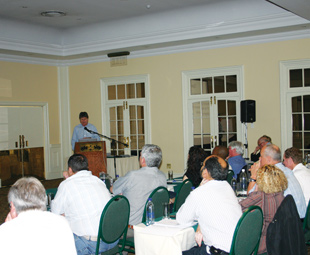Transport of Dangerous Goods: Be prepared and compliant!

The Chemical and Allied Industries’ Association held a “Responsible Care” workshop on 16 September at the Johannesburg Country Club to put the thorny issue of safe transport of Dangerous Goods under the spotlight. Stakeholders in the chemical and transport industries were informed of, amongst other important matters, changes in the revised South African National Standards (SANS) codes and the implications of AARTO for the transport industry.
A vast number of guidelines, codes of practice and legislation must be complied with to ensure the safe and legal transport of hazardous materials. The “Responsible Care” programme recognises the need for increasing knowledge and awareness with regard to these criteria amongst both chemical companies and transport operators alike. In line with the “Responsible Care” programme’s goal of improving the safety, health and environmental performance of companies in the chemical industry, workshops were held in both Johannesburg and Durban to address the relevant safety and legal concerns.
Gavin Kelly, technical and operations manager of the RFA, started off proceedings with a lively presentation on the impending nationwide implementation of the Administrative Adjudication of Road Traffic Offences (AARTO) system, which shifts the adjudication of less serious traffic offences from legal to civil proceedings. AARTO will tackle the widespread disregard of speed limits and other traffic laws on South African roads by introducing a fast and efficient procedure for overseeing traffic infringements and penalising drivers and operators who are guilty of such infringements by means of the allocation of demerit points.
Kelly explained that the accumulation of the demerit points assigned to repeated offenders would ultimately lead to the suspension or cancellation of their driving licences, professional driving permits and operator cards. Furthermore, AARTO will enforce the payment of fines by seizing the property of those who persistently ignore requests for outstanding payments. This approach is expected to improve quite significantly the current figure of a mere 20% success rate in finalisation and payment of fines.
Kelly outlined a number of key differences between the AARTO system for overseeing traffic infringements and the current system, which is managed in terms of the Criminal Procedure Act (CPA). The take-home message for both transport operators and citizens, however, is that every demerit point that exceeds the specified 12-point limit, will result in the suspension of the licence, permit or operating card of the affected party, for a three-month period. In contrast, anyone who has received demerit points will have one point subtracted from their total every three months, if they are not found guilty of any further infringements during this period. Furthermore, demerit points may be allocated simultaneously to both a driver and an operator, based on a particular infringement, even if the points are assigned with reference to the very same incident.
 Allan Dunn, technical and SHEQ executive of Unitrans, provided information on the new SANS 10231 – 2010 standard that specifies rules and procedures for the safe operation and management of all road vehicles used for the transport of dangerous goods in accordance with load constraints. Dunn discussed the “Duty of Care” that obliges all road users to ensure that their vehicles and the operations of these vehicles are legally compliant with prevailing safety standards, but stressed that this obligation applies even more strongly to those involved in the business of dangerous goods. He focused on the declaration of dangerous goods, incident report submissions, vehicle inspection schedules and the importance of record keeping.
Allan Dunn, technical and SHEQ executive of Unitrans, provided information on the new SANS 10231 – 2010 standard that specifies rules and procedures for the safe operation and management of all road vehicles used for the transport of dangerous goods in accordance with load constraints. Dunn discussed the “Duty of Care” that obliges all road users to ensure that their vehicles and the operations of these vehicles are legally compliant with prevailing safety standards, but stressed that this obligation applies even more strongly to those involved in the business of dangerous goods. He focused on the declaration of dangerous goods, incident report submissions, vehicle inspection schedules and the importance of record keeping.
Richard Durrant, owner of Transheq Consulting, provided an update on the progress made in the direction of standardising both Municipal Transport Permits (i.e. “Fire Permits”) and inspection requirements for the transport of dangerous goods in South Africa. Durrant discussed recent collaboration between business and government, specifically the Department of Cooperative Government and Traditional Affairs. The Department is attempting to resolve the inconsistencies in inspection requirements of different municipalities and fire departments regarding the conflict that arises with regard to the application of outdated by-laws, and the resulting confusion and operational challenges for the industry.
Keith McMurray, dangerous goods road legislation consultant, discussed the frequently overlooked “hidden aspects of compliance” for the transport of dangerous goods in South Africa. McMurray provided valuable information on the classification of dangerous goods, the format and content of documentation, statutory insurance, the packaging requirements for dangerous goods (including marking and labeling), vehicle maintenance by outsourced providers, heavy vehicle design and training of qualified persons. McMurray emphasised that compliance with The National Road Traffic Act and related SANS standards requires consignors and operators to take all of these factors into account.
Hentie van Jaarsveldt, technical consultant for Anfos Consulting, presented an informative overview of the standards involved in road tanker design in South Africa. Van Jaarsveldt traced the historical development of the crucial SANS 1518 standard, which has been a legal requirement since 2001, focusing on the principles that inform this standard and the contents of the extant SANS 1518:2008 version. In addition, Van Jaarsveldt provided insight into the pending changes contained in the new SANS 1518, which applies to all vehicle sizes and is in its final stages before publication. Van Jaarsveldt concluded by appealing to all stakeholders in the transportation industry to adopt a proactive approach to developing improved safety legislation in South Africa.
Garth Jooste, environmental health and safety technologist for Safripol, rounded off proceedings with a fascinating analysis of the prospective benefits of implementing a Behaviour Based Performance Programme for enhancing accident prevention and occupational health and safety. Jooste illustrated these benefits with reference to the Safripol Behaviour Based Performance Programme, which has dramatically reduced accidents and losses associated with unsafe human behaviour.
Published by
Focus on Transport
focusmagsa



